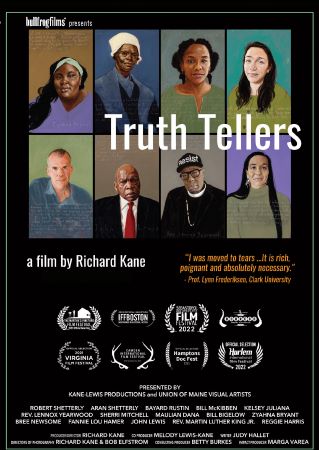
Truth Tellers 2021
Distributed by Bullfrog Films, PO Box 149, Oley, PA 19547; 800-543-FROG (3764)
Produced by Richard Kane and Melody Lewis-Kane
Directed by Richard Kane
Streaming, 58 mins
K-12
Activism; Art; Political Science; U.S. History
Date Entered: 04/26/2023
Reviewed by Jennifer Dean, Film Editor, Filmmaker, Film CuratorRichard Kane’s hour-long documentary Truth Tellers about artist and activist Robert Shetterly focuses on his portrait series “Americans Who Tell the Truth,” which Shetterly began in 2002 - and highlights a few of the subjects of the series depicting Americans who have upheld the standards of democracy, sometimes through dissent and always through truth telling. Art can reflect life (through rose-colored glasses or as a harsh depiction of reality) - and art can transcend the mundane to inform and inspire the viewer. Shetterly’s series of portraits with famous quotes by the subjects stenciled into the frame is, he admits, his first foray into didactic art. As an activist as well as an artist he uses his craft and creative impulses through his series to connect with social justice movements and younger generations. As is noted on his website, “The portraits have given Shetterly an opportunity to speak with children and adults all over this country about the necessity of dissent in a democracy, the obligations of citizenship, sustainability, US history, and how democracy cannot function if politicians don’t tell the truth, if the media don’t report it, and if the people don’t demand it.” Shetterly uses the paintings as a launching off point for discussion with students and others around the country.
Similar to Shetterly’s “Americans Who Tell the Truth” series, Kane’s documentary Truth Tellers could be a great gateway to learning more about the ideas and people depicted in the portraits. Shetterly’s numerous paintings (currently more than 260) with the stenciled inspirational quote are to be used as a springboard for a larger conversation because a quote, of course, can only tell us so much. The artworks are a door into a larger story. Kane’s film serves as an introduction to Shetterly and his subjects but not a deep dive into the concepts which it touches upon. The documentary is most successful in depicting how Shetterly uses the paintings to engage with young students and communities, with vérité footage of public presentations and student gatherings of him talking about the work and the story behind their subjects.
Kane also uses discussions between Shetterly and those he paints to address concepts of democratic principles where Kane (who also edited the film) occasionally intercuts archival footage or photographs. The interviews with Shetterly’s portrait subjects are engaging but often leave the viewer wanting to know more about each of them and the movements they represent - which of course is what makes Kane’s film a good prologue for younger audiences, perhaps a junior high school class of Political Science or American Government students. Unfortunately, the use in the film of stock music as score ultimately undermines its substance, giving it a corporate or promotional feel, making it less applicable to more mature academic audiences. The snippets of Shetterly in his garden and the interview bites from his son (also Executive Director of the eponymous Non-Profit) add to the promotional tone of the piece.
Through the film Kane exposes the viewer to lesser known activists including Bayard Rustin and Sherri Mitchell while also touching on extremely well-known figures such as John Lewis (recently the subject of a comprehensive documentary by Dawn Porter, Good Trouble) which is why I recommend the film with reservations. It would be a good way to introduce younger students to a variety of key players in the American democratic process and provoke a discussion about the use of art in social justice movements and as a platform for community engagement.
Awards: Audience Award for Best Film, Whistleblower Summit & Film Festival
Published and licensed under the Creative Commons Attribution 4.0 license. Anyone can use these reviews, so long as they comply with the terms of the license.